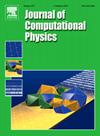A fourth-order compact finite volume method on unstructured grids for simulation of two-dimensional incompressible flow
IF 3.8
2区 物理与天体物理
Q2 COMPUTER SCIENCE, INTERDISCIPLINARY APPLICATIONS
引用次数: 0
Abstract
This paper introduces a novel and efficient compact reconstruction procedure for high-order finite volume methods applied to unstructured grids. In this procedure, we establish a set of constitutive relations that ensure the continuity of the reconstruction polynomial and its normal derivatives between adjacent elements at control points. The paper delves into the details of the fourth-order compact reconstruction method specifically designed for two-dimensional triangular grids. This method can be considered an extension of the one-dimensional compact scheme and cubic spline interpolation methods to two-dimensional triangular unstructured grids. In the cubic polynomial reconstruction, a two-dimensional cubic polynomial is reconstructed using the cell averages of elements in the standard stencil and the function values at control points. The determination of function values at control points is achieved by adhering to the constraint of normal derivative continuity. This reconstruction is solved using a relaxation iteration method and has been verified to be solvable for triangular grids. Compared to other fourth-order implicit compact polynomial reconstructions, our method requires solving a smaller number of unknowns, which means less computational cost in reconstruction. By applying this method to solve the Poisson equation, the linear convection equation, and incompressible flow benchmarks, it demonstrates that the proposed method exhibits the expected high-order accuracy and performs well in incompressible flow problems.
非结构网格上的四阶紧凑有限体积法模拟二维不可压缩流动
本文为应用于非结构网格的高阶有限体积方法介绍了一种新颖、高效的紧凑重建程序。在该程序中,我们建立了一组构成关系,确保控制点上相邻元素之间重建多项式及其法导数的连续性。本文深入探讨了专为二维三角形网格设计的四阶紧凑重构方法的细节。该方法可视为一维紧凑方案和三次样条插值方法在二维三角形非结构网格上的扩展。在三次多项式重构中,利用标准模版中元素的单元平均值和控制点的函数值重构二维三次多项式。控制点上函数值的确定是通过遵守法线导数连续性约束来实现的。该重构采用松弛迭代法求解,并已验证可用于三角形网格。与其他四阶隐式紧凑多项式重构相比,我们的方法需要求解的未知数更少,这意味着重构的计算成本更低。通过应用这种方法求解泊松方程、线性对流方程和不可压缩流基准,证明了所提出的方法具有预期的高阶精度,在不可压缩流问题中表现良好。
本文章由计算机程序翻译,如有差异,请以英文原文为准。
求助全文
约1分钟内获得全文
求助全文
来源期刊

Journal of Computational Physics
物理-计算机:跨学科应用
CiteScore
7.60
自引率
14.60%
发文量
763
审稿时长
5.8 months
期刊介绍:
Journal of Computational Physics thoroughly treats the computational aspects of physical problems, presenting techniques for the numerical solution of mathematical equations arising in all areas of physics. The journal seeks to emphasize methods that cross disciplinary boundaries.
The Journal of Computational Physics also publishes short notes of 4 pages or less (including figures, tables, and references but excluding title pages). Letters to the Editor commenting on articles already published in this Journal will also be considered. Neither notes nor letters should have an abstract.
 求助内容:
求助内容: 应助结果提醒方式:
应助结果提醒方式:


